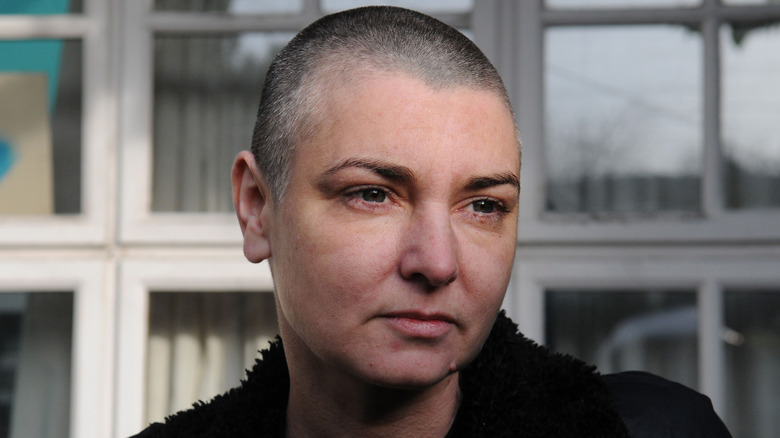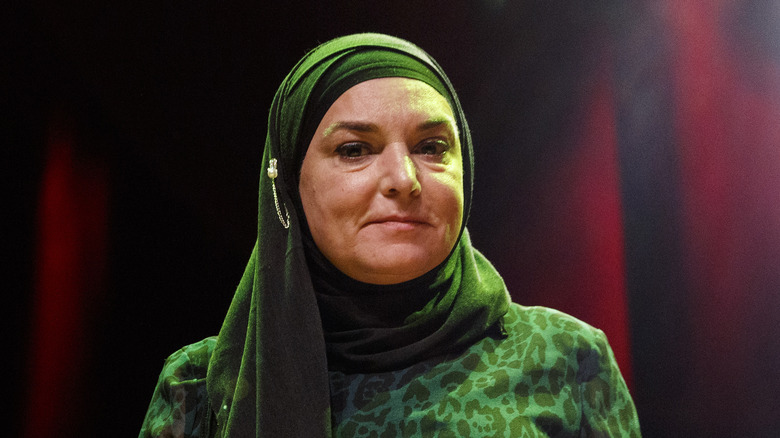Sinéad O'Connor's Autopsy Report Left Everyone With So Many Questions
This article includes mentions of mental illness and suicidal ideation.
Sinéad O'Connor was enigmatic and mysterious to many in life, so it's only fitting that her death also left people scratching their heads in bewilderment. And sadly, anybody who was hoping that her autopsy would bring some much-needed answers was sorely mistaken.
The "Nothing Compares 2 U" singer was found dead in July 2023. Police discovered O'Connor in her Herne Hill, London home after responding to reports of an "unresponsive woman." She was 56. O'Connor had only recently moved into the apartment and seemed excited for the future, hoping to kickstart her career again by recording new music. "It is with great sadness that we announce the passing of our beloved Sinéad," her loved ones said in a statement (via Rolling Stone). "Her family and friends are devastated and have requested privacy at this very difficult time."
Fans scrambled to make sense of the shocking news, and speculation was rife. When O'Connor's cause of death was finally confirmed in January 2024, it left a multitude of unanswered questions and did little to quell conjecture. "This is to confirm that Ms O'Connor died of natural causes," a statement from Southwark Coroner's Court read (via BBC). "The coroner has therefore ceased their involvement in her death."
Sinéad struggled after her son's death
Sinéad O'Connor's death in July 2023 left the music world brokenhearted. People were desperate to know what happened, and sadly, O'Connor's autopsy report did little to answer questions. Fans focused on the tragic details of Sinéad's life, which were common knowledge. She'd been open about her struggles with mental health and diagnoses of bipolar disorder, complex PTSD, and borderline personality disorder.
Sinéad suffered a breakdown in 2015, cycled in and out of treatment facilities, and peppered social media with alarming posts. "I was mental," she told People in May 2021. "But I don't regret those 'embarrassing' videos. I'm quite proud, in a weird way, that I was that open. The nature of a singer is to be emotionally honest. I've always been pretty open. And I have no regrets."
Sadly, Sinéad suffered a mental health relapse after her son took his own life in January 2022. "My beautiful son, Nevi'im Nesta Ali Shane O'Connor, the very light of my life, decided to end his earthly struggle today and is now with God," Sinéad shared in a now-deleted post on X, formerly Twitter (via the Independent). "May he rest in peace and may no one follow his example. My baby. I love you so much. Please be at peace." Days later, she was hospitalized following a spate of heartbreaking social media posts in which she blamed herself for Nevi'im's death, expressed suicidal ideation, and vowed to join her son.
If you or someone you know is struggling or in crisis, help is available. Call or text 988 or chat 988lifeline.org
If you or someone you know needs help with mental health, please contact the Crisis Text Line by texting HOME to 741741, call the National Alliance on Mental Illness helpline at 1-800-950-NAMI (6264), or visit the National Institute of Mental Health website.
Did Sinéad actually die from a broken heart?
Sinead O'Connor was just 56 when she died in July 2023, so the coroner's ruling that she passed away from natural causes didn't cut muster with many. Dermott Hayes, who had an on-off relationship with the singer for two years, was among those left questioning the finding after he read the autopsy report. "From this, you can surmise that a broken heart is a real illness symptom and a cause of death," he told The Irish Sun in January 2024. "It doesn't make Sinead's passing any less painful. It was more to do with a broken heart than anything else."
When O'Connor died, she didn't just leave a musical legacy behind. She was praised extensively for her fearless commitment to discussing her struggle with mental illness and her determination to destigmatize the issue.
"I really feel the use of the word 'crazy,' or associated words as terms of abuse, should become a crime punishable by imprisonment," O'Connor told People in 2012. "We need to be compassionate and gentle toward those of our brothers and sisters who have been hurt and are wounded and fragile while also strong and alive. We should not mock those who are brave enough to show their wounds."



